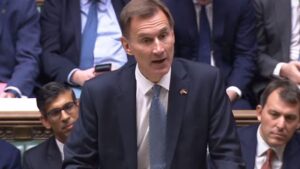British government borrowing shot up to a December record on the back of a climbing debt interest bill and the cost of energy subsidies for households and businesses.
Official figures show public sector borrowing hit £27.4 billion last month, the highest for December since equivalent records began, according to the Office for National Statistics (ONS). It eclipses the high borrowing of the pandemic and is far above economist expectations of £17.7 billion.
Government borrowing is now £9.8 billion higher than projections from the Office for Budget Responsibility, putting pressure on Jeremy Hunt, the chancellor, who has vowed to stabilise the public finances after last September’s shambolic mini-budget from his predecessor Kwasi Kwarteng.
The ONS said the government paid a record of £17.3 billion to service the cost of debt linked to inflation. Double-digit inflation has persisted since September, putting fiscal strain on index-linked gilts.
Total UK borrowing stands at 99.5 per cent of gross domestic product (GDP), said the ONS, with borrowing also elevated by the payment of subsidies to support households facing high energy bills this winter. The debt to GDP ratio is at levels last seen in the early 1960s.
Responding to the figures, Hunt said: “Right now we are helping millions of families with the cost of living, but we must also ensure that our level of debt is fair for future generations.”
“We have already taken some tough decisions to get debt falling, and it is vital that we stick to this plan so we can halve inflation this year and get growth going again — creating better paid jobs across the country.”
Despite the borrowing overshoot last month, the chancellor could still boast a windfall of around £10 billion to spend on giveaways at the March spring statement after energy prices falls have provided unexpected fiscal wriggle room for the Treasury.
The chancellor has set new fiscal rules to get public borrowing as a share of gross domestic produce on a declining path in the next five years, and the budget deficit to a limit of 3 per cent of GDP.
Read more:
UK borrowing pushed to new record amid energy crisis and debt bill


























